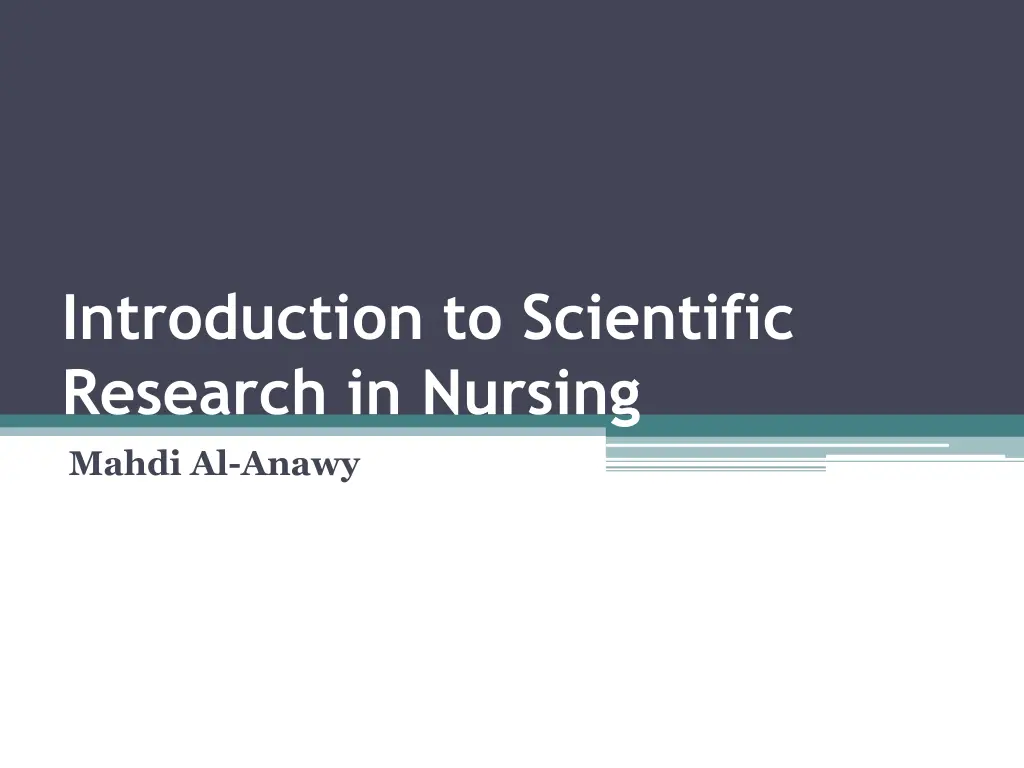
Scientific Research in Nursing: Key Concepts and Purposes
Explore the fundamental concepts of scientific research in nursing, including the systematic approach, empirical evidence, and ethical considerations. Learn about different types of research and the purposes it serves in improving patient care, advancing nursing knowledge, and promoting health equity. Discover how research contributes to professional growth, problem-solving, and policy development in the field of nursing.
Download Presentation

Please find below an Image/Link to download the presentation.
The content on the website is provided AS IS for your information and personal use only. It may not be sold, licensed, or shared on other websites without obtaining consent from the author. If you encounter any issues during the download, it is possible that the publisher has removed the file from their server.
You are allowed to download the files provided on this website for personal or commercial use, subject to the condition that they are used lawfully. All files are the property of their respective owners.
The content on the website is provided AS IS for your information and personal use only. It may not be sold, licensed, or shared on other websites without obtaining consent from the author.
E N D
Presentation Transcript
Introduction to Scientific Research in Nursing Mahdi Al-Anawy
Introduction to Scientific Research in Nursing Research is a systematic inquiry (examination) into a subject that uses various approaches to answer questions and solve problems. Research means to search again or examine carefully. It investigate the old knowledge and generate new knowledge. Systematic means carried on in step-by-step procedure, methodical or orderly.
1-Basic Concepts in Scientific Research Scientific research is a systematic process of gathering, analyzing, and interpreting information to answer a question or solve a problem.
Basic Concepts in Scientific Research: 1- Systematic Approach: Involves structured methods and procedures to ensure reliability and validity. 2- Empirical Evidence: Research relies on data collected through observation or experimentation.
3- Ethics in Research: Research in nursing ust prioritize ethical principles, such as: Respect for individuals. Beneficence (doing good). Justice (fairness in research participation).
Types of Research: 1. Basic Research: Aims to expand fundamental knowledge without immediate application. 2. Applied Research: Focuses on solving practical problems. 3. Quantitative Research: Relies on numerical data and statistical analysis. 4. Qualitative Research: Explores phenomena through non-numerical data like interviews and observations.
2. Purposes of Scientific Research in Nursing Research serves multiple roles in the field of nursing. Its primary purposes include: 1. Improving Patient Care: Developing evidence-based practices. Identifying best practices for disease prevention and management. 2. Advancing Nursing Knowledge: Exploring new theories and concepts. Building on previous research to deepen understanding. 3. Policy Development: Informing healthcare policies and guidelines.
4- Professional Growth: Encouraging critical thinking and lifelong learning among nurses. 5- Problem-Solving: Addressing specific challenges in clinical settings. 6- Promoting Health Equity: Investigating disparities in healthcare to design interventions for vulnerable populations.
3. Characteristics of Scientific Research 1. Systematic: Research follows a defined process with specific steps, such as problem identification, literature review, methodology, data collection, and analysis. 2. Logical: Conclusions are drawn based on sound reasoning and evidence. 3. Empirical: Findings are grounded in observable, measurable data.
Characteristics of Scientific Research 4-Reproducible: Other researchers can replicate the study to verify results. 5- Innovative: Generates new knowledge or applies existing knowledge in novel ways. 6- Ethical: Adheres to ethical standards in design and implementation.
Research Hypothesis: A hypothesis is a testable statement predicting the relationship between variables. Types of Hypotheses: Null Hypothesis (H ): Assumes no effect or relationship between variables. Alternative Hypothesis (H ): Proposes a specific effect or relationship.
Types of Hypotheses: For example: is there a relationship between obesity and diabetes mellitus ? This might be translated into the following prediction: hypothesis or H0=There is and diabetes mellitus. no-relationship between obesity H1=There is a relationship between obesity and diabetes mellitus.
Relevance to Nursing Understanding and conducting scientific research is critical for: Enhancing patient outcomes. Ensuring safe, ethical, and effective care. Keeping up with technological and methodological advancements in healthcare.
Conclusion Scientific research in nursing bridges the gap between theory and practice. By understanding its basic concepts, purposes, characteristics, and the role of a hypothesis, nurses can effectively contribute to and apply research in clinical settings, fostering an evidence-based approach to care.
Questions or Discussion Points: Can you think of examples where research has improved nursing practice? How do you see research shaping your future role in nursing?
Start by doing whats necessary; then do what s possible; and suddenly you are doing the impossible






















